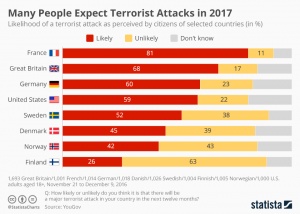
Terrorism in France: Past and Present

Photo: International Business Times, 2015
Of the 28 countries that make up the European Union, France has constantly been an influential force in shaping policy and taking action against extremist threats. Be that as it may, unfortunately, France also has the highest frequency of terror attacks of any EU country. The government has struggled not only to combat such provocations but also to understand why they have become so widespread.
France has the largest Muslim population in Europe and in 2015 11.8% of its population was foreign-born, compared to 8.9% in 2014. This number has risen and fallen as the EU has struggled to create and enforce strict immigration policies. Due to such bureaucratic logjams terror organizations have been able to infiltrate the country and recruit local and foreign citizens in its jails. The contagion can be traced back to a policy that was scrapped by then Minister of the Interior, Nicolas Sarkozy, in 2002.
Sarkozy eliminated the “Police de Proximité,” which was a neighborhood policing policy designed to effect friendlier police work. The absence of this program resulted in resentment of officers of the law, as well as an increase in repressive tactics and arrests. Consequently, many African and Middle Eastern youth were placed in French prisons, which proved fertile grounds for radicalization. They were angry, poor, and had criminal records – all reasons why recruiters for Islamic extremist organizations like ISIL (the Islamic State of Iraq and the Levant) were able to radicalize them.
Since the 2002 spike in arrests, many of those who were radicalized have been released from prison and have gone on to perpetrate violence in France. How best to combat this rise in terrorism? An effort must be made to halt recruitment in French prisons. As for society as a whole, an outreach program to French youth, especially in inner cities and their schools, would prove beneficial. Such programs function like an inoculation against terror, stifling recruitment and the flow of extremist ideology.
In 2013 France went to war against two Muslim governments when it invaded Mali and the Central African Republic (CAR). This exacerbated tensions and widened the divide between Muslims and the French government. ISIS has carried out its deadliest assaults since this time. On January 7th, 2015 two Islamist gunmen forced their way into the Paris headquarters of satirical weekly news-magazine Charlie Hebdo and opened fire, killing twelve. Less than a year later, on November 13th, 2015, nine EU citizen members of ISIL launched a coordinated offensive at a soccer stadium, a concert hall, restaurants, and bars. 130 were killed, and 413 were wounded. On Bastille Day in 2016, an Islamic State supporter drove a truck through a crowd, killing 86 people. Just 12 days later ISIL soldiers slit the throat of an 85-year-old priest in Normandy, killing him.
Between 1980 and 2003, a span of 23 years, terror strikes killed 87 people in France. Between 2003 and 2018, only 15 years, three times as many people (250) were killed. The question remains, how can France and other EU countries stop attacks before they occur? The answer necessarily lies in policy. An anti-terrorism law was passed in 2014 that allowed the government to prevent at-risk citizens from leaving the country. The same law banned EU citizens from entering France if they were deemed a threat to society. The “French Patriot Act” passed in 2015, created a vast surveillance program. It proved a massive step in advancing French security, and it continues to pave the way for intelligence and law enforcement agencies to curb the dispersal of terrorist ideologies.
French President Emmanuel Macron promises to tighten French immigration policy, but what’s missing, as stated earlier, is a comprehensive strategy aimed at educating the public with the intention of inoculating it against extremist views.
France is at a crossroads. Today’s legislation is vital to the country’s future. There must be a proactive strategy for countering terrorist recruitment. Those who would be affected most by such preventative measures, youth, are responsible for France’s future. Whether they step into a future that is violent or peaceful is up to lawmakers today.

Photo: yougov.uk
Sources
Laurence, Jonathan, and Justin Vaisse. “Understanding Urban Riots in France.” Brookings, Brookings, 28 July 2016, https://www.brookings.edu/articles/understanding-urban-riots-in-france/
Tribalat, M. “M. Tribalat.” Population, Institut National D’études Démographiques, 23 Jan. 2018, https://www.persee.fr/doc/pop_1634-2941_2004_num_59_1_18464
“Bilan Démographique 2016À Nouveau En Baisse, La Fécondité Atteint 1,93 Enfant Par Femme En 2016 .” Bilan Démographique 2016 – Insee Première – 1630, https://www.insee.fr/fr/statistiques/2554860
McPartland, Ben. “Some Truths about Immigration in France.” The Local, The Local, 13 Oct. 2015, https://www.thelocal.fr/20151013/some-truths-about-migration-to-and-from-france
RFI. “Auditors Slam Sarkozy Policing Policy.” RFI, RFI, 8 July 2011, http://en.rfi.fr/france/20110708-auditors-slam-sarkozy-policing-policy
Astier, Henri. “Paris Attacks: Prisons Provide Fertile Ground for Islamists.” BBC News, BBC, 5 Feb. 2015, http://www.bbc.com/news/world-europe-31129398
“46 Years of Terrorist Attacks in Europe, Visualized.” The Washington Post, WP Company, www.washingtonpost.com/graphics/world/a-history-of-terrorism-in-europe/.
https://www.washingtonpost.com/graphics/world/a-history-of-terrorism-in-europe/
Smith, David, and Kim Willsher. “Clashes in Central African Republic as UN Authorises French Intervention.” The Guardian, Guardian News and Media, 5 Dec. 2013, https://www.theguardian.com/world/2013/dec/05/central-african-republic-un-vote-french
Nicolas. “Global Legal Monitor.” France: National Assembly Adopts Immigration Bill | Global Legal Monitor, 9 Sept. 2015, http://www.loc.gov/law/foreign-news/article/france-national-assembly-adopts-immigration-bill/
Loesche, Dyfed, and Felix Richter. “Infographic: Many People Expect Terrorist Attacks in 2017.” Statista Infographics, 23 Mar. 2017, https://www.statista.com/chart/8638/many-people-expect-terrorist-attacks-in-2017/
